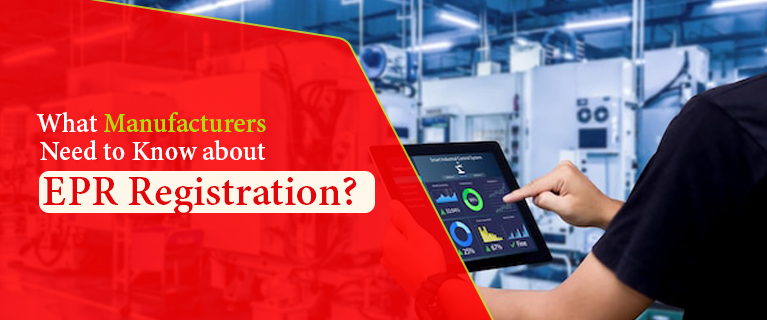How EPR Services Ensure Sustainable Practices?
Extended Producer Responsibility (EPR) is a concept aimed at promoting sustainable waste management and reducing the environmental impact of products and packaging. EPR services play a crucial role in helping producers and manufacturers take responsibility for their products throughout their life cycle, including after they become waste. These services are now widely available across various industries, enabling businesses to comply with environmental regulations, enhance their sustainability efforts, and contribute to a cleaner and greener future. In this blog, we will explore the availability of EPR services and how businesses can avail them to make a positive impact on the environment.
Understanding EPR Services
EPR services or registration involve the implementation of systems that require producers and manufacturers to take responsibility for the post-consumer phase of their products. This includes designing products with recycling in mind, collecting and managing waste, and ensuring proper disposal or recycling of end-of-life products. EPR services aim to create a circular economy by reducing the burden on landfills and promoting the reuse of resources, thereby minimizing the environmental footprint.
Availability of EPR Services
1. E-Waste Recycling:
E-waste, which includes discarded electronic devices, is a significant environmental concern. EPR services for e-waste recycling are available in many countries, including India. These services facilitate the proper collection, segregation, and recycling of electronic waste, ensuring the recovery of valuable materials and the safe disposal of hazardous components.
2. Plastic Waste Management:
Plastic pollution is a global crisis, and EPR services for plastic waste management are becoming increasingly available. These services involve setting up collection centers for plastic waste, recycling facilities, and initiatives to encourage the use of eco-friendly alternatives.
3. Packaging Waste:
Packaging waste is a major contributor to environmental pollution. EPR services for packaging waste management involve collaboration with producers and manufacturers to design sustainable packaging, promote recycling, and implement take-back programs for used packaging materials.
4. Battery Recycling:
EPR services for battery recycling focus on the proper disposal of used batteries, which can be hazardous if not managed correctly. These services facilitate the safe collection and recycling of batteries to recover valuable materials and prevent environmental contamination.
5. Pharmaceutical Waste:
EPR services for pharmaceutical waste management are gaining traction to address the improper disposal of expired or unused medications. These services focus on safe collection and disposal methods to prevent pharmaceutical contaminants from entering the environment.
6. Paper Recycling:
EPR services for paper recycling promote the responsible use of paper, encourage recycling, and support sustainable forestry practices to reduce deforestation.
Availing EPR Services
1. Research and Identify Service Providers:
To avail of EPR services, businesses need to research and identify service providers that offer the specific services relevant to their industry and waste management needs. Look for accredited and authorized service providers with a track record of successful EPR initiatives.
2. Evaluate Sustainability Goals:
Assess your business's sustainability goals and align them with the EPR services that will best support your environmental objectives. This may include reducing waste generation, increasing recycling rates, or implementing eco-friendly packaging solutions.
3. Collaborate with Producers and Manufacturers:
If you are a producer or manufacturer, collaborate with EPR service providers to design products with recycling and environmental impact in mind. Work together to implement take-back programs and develop sustainable packaging solutions.
4. Implement Waste Collection Mechanisms:
Work with EPR service providers to implement waste collection mechanisms that ensure proper segregation and disposal of waste. This may involve setting up collection centers, providing recycling bins, or organizing recycling drives.
Work with EPR service providers to implement waste collection mechanisms that ensure proper segregation and disposal of waste. This may involve setting up collection centers, providing recycling bins, or organizing recycling drives.5. Educate Employees and Customers:
Educate your employees and customers about the importance of EPR and sustainable waste management. Encourage their participation in recycling initiatives and responsible waste disposal practices.
6. Monitor and Measure Impact:
Regularly monitor and measure the impact of EPR services on your waste management efforts and environmental goals. Use data to identify areas for improvement and make informed decisions for continuous sustainability enhancements.
Read Also This - EPR License as An Easy Way to Save the EnvironmentConclusion
EPR services play a vital role in promoting sustainable waste management practices and reducing the environmental impact of products and packaging. With the availability of diverse EPR services, businesses across various industries can contribute to a cleaner and greener future. By collaborating with service providers, implementing effective waste collection mechanisms, and educating employees and customers, businesses can make a positive impact on the environment and support the transition towards a circular economy. Embracing EPR services is not only a responsible business practice but also a significant step towards a more sustainable and environmentally conscious world.




Comments
Post a Comment